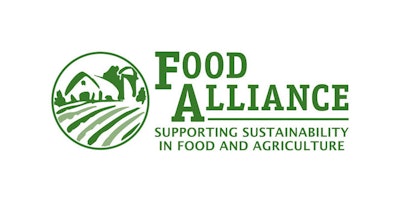
PORTLAND, Ore., July 12, 2017 (PRNewswire) — At a time when consumers worldwide are increasingly seeking more socially and environmentally responsible products, the non-profit Food Alliance is celebrating 20 years as the most comprehensive certification for sustainable agriculture and food handling in North America.
"Working collaboratively with a wide range of stakeholders to develop sustainability standards and criteria, Food Alliance has shown that greater transparency and continuous incremental improvement of management practices benefit farmers, the food industry, consumers, and the planet," said director Matthew Buck. "We remain committed to partnering with the research, advocacy, and business communities to define and deliver Good Food for a Healthy Future."
"Food Alliance has conducted over 1,000 farms, ranch, and facility audits," he added. "That experience has given us insights into how farm and food businesses benefit from the implementation of more sustainable practices, what values retailers and consumers want to be represented in the food they buy, and what social and environmental marketing claims are both credible and compelling."
Food Alliance started in 1994 as a project of Oregon State University, Washington State University, and the Washington State Department of Agriculture, with a grant from the W.K. Kellogg Foundation, to develop standards for sustainable agriculture. Food Alliance was launched as an independent 501(c)3 non-profit organization in 1997. Stahlbush Island Farms outside Corvallis, Oregon became the first Food Alliance certified farm in September that year -- and now markets Food Alliance certified frozen fruits and vegetables nationwide. Director of Agriculture Quality & Compliance Tina Galloway said, "Now there is a growing chorus of claims about where food comes from and how it is grown. Food Alliance was there back at the beginning of the conversation and has always been a steadfast, credible and authentic advocate for sustainability."
Over the last two decades, Food Alliance has diversified by product category and geography. Criteria for livestock were introduced in 2000. Certification for food handlers, including packers, processors, and distributors, debuted in 2006. Programs followed for grassfed livestock claims (2009), farmed shellfish (2011), and nursery products (2012). Food Alliance certification has also spread from the Pacific Northwest to 25 US states. An update to Food Alliance standards and criteria implemented in 2015 now allows certification anywhere in North America.
In 2016, Food Alliance partnered with the Natural Resources Defense Council and the Rainforest Alliance to develop a Grasslands Alliance standard for regenerative grazing in North America. That draft standard is posted for public review and comment at grasslandsalliance.org. Starting in 2017, Food Alliance will also be providing audits for the National Audubon Society's Conservation Ranching program for restoration and enhancement of habitat important to grassland birds.
In 2016 sales of Food Alliance Certified products reached $160 million, a figure representing the farm gate value of fresh products, and added a wholesale value of processed products. Since the inception of the program, over $1.2 billion in Food Alliance Certified products have been sold.






















